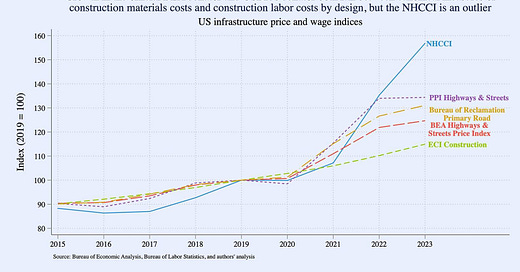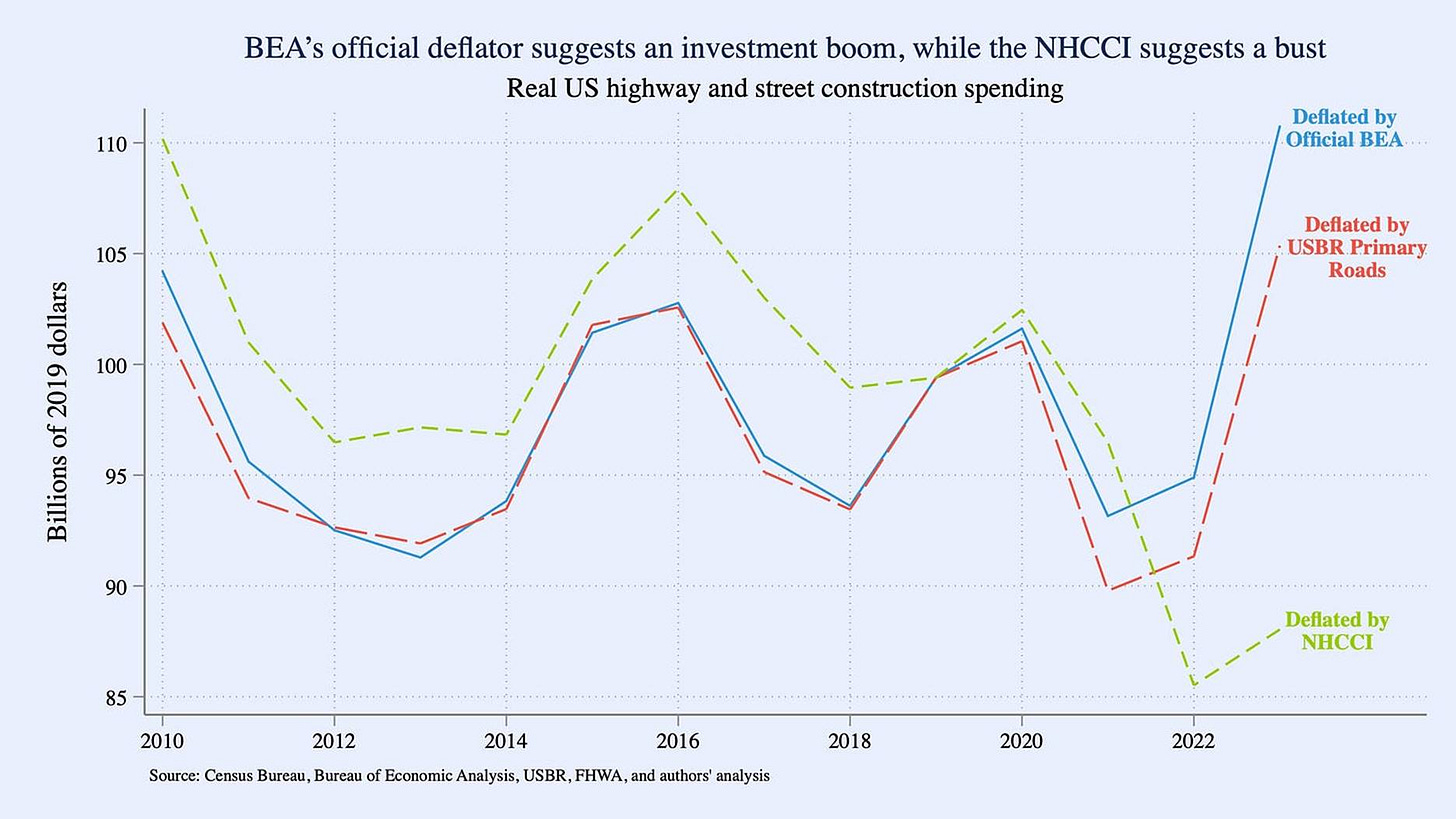Furman's Bidenomics Critique: Update
Two big brains clarify the infrastructure spending confusion and I question Jason’s timing.
Recall that in my response to Jason Furman’s deep critique of Bidenomics—he calls it a “tragedy;” I and others firmly reject that view and point out many important, lasting achievements—I pointed out that he and I have a different understanding of the path of infrastructure spending on our watch. He shows it going down; I show it going up.
The mystery is solved in this clarifying piece by Ernie Tedeschi and Eric Van Nostrand. As shown in the first figure below, in order to put the spending in real dollars—essential for comparisons over time—Jason chose to use a price deflator that rose much faster than other legit choices. The choice of this outlier series drives his result.
That doesn’t make it wrong but Ernie and Eric point out that there’s reason to believe the other choices are doing a better job of picking up both materials and labor costs, while Jason’s choice may upweight materials. This drives the result, because, as you see in the above chart, labor costs grew more slowly than materials’ costs.
Here’s the punchline:
Infrastructure investment looks strong using the other price deflators, and weak using the one chosen by Jason.
Ernie and Eric go the extra mile (!!) in a cool section which puts aside the deflator issue and looks at various measures of the quantity of roads built, finding that “Directly measuring highway length shows a surge in infrastructure growth.” So, the weight of the evidence favors their take, but I’m sure Jason, who’s a very able data guy, will want to respond.
Speaking of responses, in case you’re tracking this, there’s been numerous critiques of Jason’s critiques. Mike Konczal makes what I found to be deep points about the vagaries of neoliberalism:
First, a serious problem with discussing economic ideas is that they change in ways that you immediately forget. So, as an example, a Democratic Council of Economic Advisors (CEA) chair in the 1990s would have understood that shooting down the idea of increasing the minimum wage was an essential part of the job. [Now,] former CEA chair Jason Furman criticizes the Biden administration for not increasing it in this article [um…Congress??].
As many of Furman’s critics stressed re market failures around climate investment, for example, how you judge the economics of such actions—whether they’re rooted in good economics or hippy delusions—depends on your evolving views of how the economy really works.
But it was the collision of two media pieces that underscored for me how far Jason is off in his critique. First, this excellent NYT oped by Richard Revesz reminded me of some very important and high quality applied economic analysis we did to significantly update how the federal government does cost/benefit analysis. I have no idea if this is neo-whatever, but it’s a real advance in a very important, consequential area of work, one that I’m sure Furman admits will improve public policy.
Until Trump revoked it.
Which brings me to the second piece: NEC director Kevin Hassett on Meet the Press last weekend, who profusely cites Jason’s takedown of Bidenomics to defend their work (“Jason Furman…calling the Biden economic record a tragedy, as this is them, not us”).
Jason has every right to raise legitimate policy questions, ones which all the respondents I cited treated with the respect they deserve from this eminent scholar. But he had to know he was giving powerful ammunition to an opposition that, whatever his beefs about us, is incomparably worse on all the economic issues he’s worried about. I don’t understand that judgement and I fear, as in the Revesz case, it’s going to do more harm than good to the progress of sound economic policy.






Furman wrote a forty page paper on income inequality rising under his tenure in 2016. And the problem has exasperated since then causing societal instability. Yet, he still has zero credible solutions on how to address the problem.
Let us not lose sight of the context - the Trump second term visa-a--vis all normal presidencies, including that of Biden. I have an uncomfortable feeling that we will be asking ourselves soon why we were so focused on arranging the deck chairs when the ship of state had clearly struck an iceberg.